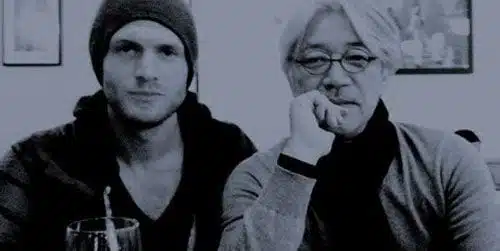
Ryuichi Sakamoto has a way with collaborators. His reflective and emotional piano compositions are timeless and seem tailor-made for an array of electronic treatments. Which is why, for an artist who began his career in the 1970s, he has remained so vital in this new musical era. Following successful collaborations with Alva Noto and Fennesz, in which each artist provided his signature sonics to a suite of piano melodies, Sakamoto moved to Ghostly International to work with label mainstay Christopher Willits, a graduate of Mills College’s prestigious electronic music program and a product of the 2000s lap-pop movement.
Willits and Sakamoto don’t initially seem like perfect fits for each other. Although Willits is quite skilled at combining acoustic and electronic instruments (and though his sounds are largely appealing), I’ve always thought he played well-executed fluff, with a pop sensibility that could occasionally be too ingratiating. But when he and Sakamoto got together for this record, something remarkable happened. Willits supplied the textures and filigree in the music; Sakamoto imbued it with depth and meaning. Such a statement simplifies what these two musicians from vastly different backgrounds were able to accomplish, but it begins to explain why this collaboration works so beautifully. Willits, it seems, had discovered his match, the piece of the puzzle that gives his art a sense of completion. And Sakamoto found in Willits someone who enhances his melodies with a light enough touch as not to overtake them or muddle their natural power.
Ancient Future is not a bliss-out — a shaky sense of unease runs beneath its gentle, dreamy surfaces. The song titles indicate an emotional working-through a problem that Willits and Sakamoto are circumspect about, but which seems a lot like grief: “Reticent Reminiscence”, “Abandoned Silence”, “I Don’t Want to Understand”. The formlessness of Ancient Future’s ambience — consisting mostly of treated piano, guitar, and a clutch of drones and flourishes — evokes the feeling of not being grounded, locked in an internal struggle without something solid to grab. The effect is similar to that of Tim Hecker’s music, absent the violence. “Levitation”, the fourth track of six, represents the album’s emotional peak. Its sustained drone slowly swells and wavers, like a bodily chord struck for longer than feels comfortable. The final two tracks, “Releasing” and “Completion”, simulate the slow drop back down, with calmer and earthier textures. If “Levitation” successfully took the listener deep into his own psyche, the album’s conclusion is meant to bring relief and closure to the experience.
My favorite moments on Ancient Future involve the combination of piano and guitar. Behind the frets, Willits reminds me so strongly of jazz guitar virtuoso Jim Hall that I had to fight the urge to ascribe the piano accompaniment to Bill Evans. The collaborators find a way to let their instruments breathe without slipping into New Age dullness. Especially on “Abandoned Silence” — a track that does not betray nearly as much darkness as implied by the title — Willits and Sakamoto, strings and keys, create magic. I hope that these two musicians were proud enough of their work, as they should be, to make more records together.
